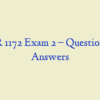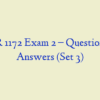Description
NUR 2407 Pharmacology
Pharm Exam 1 Question and Answers
- What nursing intervention is appropriate for a 70-year-old female patient receiving lithium?
- A nurse is caring fora patient who is taking lithium for mania. The nurse’s assessment includes a notation of a lithium serum level of 2.4 mEq/L. The nurse anticipates seeing what?
- The nurse administers chlorpromazine intramuscularly to the preoperative patient who is extremely anxious about surgery in the morning. What priority teaching point will the nurse provide this patient?
- The nurse is presenting an in-service at a children’s unit on hyperactivity. The nurse is told that a 6-year-old on the unit is being treated with methylphenidate (Ritalin), an amphetamine. The presenting nurse talks about discharge teaching for this patient and the importance of monitoring what?
- The nurse is caring for a patient taking an oral neuroleptic medication, haloperidol. What is the
- A patient diagnosed with bipolar disorder is to be discharged home in 48 hours. The nurse has complete patient teaching regarding the use of lithium. What statement by the patient indicates an understanding of their responsibility?
- A patient has just been prescribed a phenothiazine. During patient teaching about this drug, what would be important for the nurse to tell the patient?
- A patient on chlorpromazine is feeling better and decides they no longer need their medication. the nurse teaches the patient that abrupt withdrawal of a typical antipsychotic medication can result in what
- A patient’s medication has been changed to clozapine (Clozaril). The nurse evaluates this patient for which life-threatening adverse effects?
- Haloperidol is a typical antipsychotic drug. What adverse effect is associated with this drug?
- The pharmacology instructor is explaining to their class the difference between the typical and the atypical groups of antipsychotic drugs. What medication would the instructor explain to the students has fewer extrapyramidal effects and greater effectiveness than older antipsychotic drugs in relieving negative symptoms of schizophrenia?
- The nurse, providing teaching about a typical antipsychotic newly prescribed for the patient, cautions against use of alcohol with the drug by explaining it will have what effect?
- Degeneration in neurons that release a neurotransmitter leads to Parkinson’s disease. What neurotransmitter is involved?
- A patient is newly diagnosed with Parkinson’s disease and levodopa (Dopar) has been prescribed. What patient teaching information should be considered a high priority for this patient?
- A patient with Parkinsonism has been told that the levodopa prescribed is no longer controlling the disease. What drug would the nurse question if ordered as adjunctive therapy?
- The nurse provides patient teaching about use of levodopa for treatment of Parkinson’s disease. What statement by the patient would indicate a good understanding of levodopa?
- A patient is newly diagnosed with parkinsonism. Parkinsonism, which may occur in association with long-term use of antipsychotics, can be treated with what drug type?
- The nurse is presenting an educational event to a local community group on Parkinson’s disease. What will the nurse tell the attendees causes the classic Parkinson’s disease symptoms?
- When providing patient teaching for older adults, the nurse employs what priority strategy to improve patient understanding?
- The nurse often gives another drug with levodopa (L-dopa) to decrease the amount of levodopa needed to reach a therapeutic level in the brain, thereby reducing adverse effects? What is the name of this drug?
- When the nurse develops a plan of care for a patient newly diagnosed with Parkinson’s disease, the nurse includes what appropriate goal for this patient?
- The nurse is teaching a group of student nurses about Parkinson’s disease. The nurse would determine teaching was successful if the students identified what neurotransmitters as imbalanced in Parkinson’s disease?
- The pharmacology instructor is discussing drugs used for the treatment of partial seizures. What accurately describes the physiological action of carbamazepine?
- The nurse evaluates the patient’s serum phenytoin (Dilantin) level and determines the level is therapeutic when it is within what range?
- A nurse is teaching a patient about his or her newly prescribed drug, phenytoin (Dilantin) for a seizure disorder. What will the nurse alert the patient to as a serious adverse effect of this drug?
- An 8-year-old child has been diagnosed with a seizure disorder and phenytoin (Dilantin) has been prescribed for him or her. What nursing diagnosis would be appropriate if the child demonstrated adverse effects to the drug?
- The nurse is providing patient education for a patient newly prescribed a hydantoin antiseizure medication. What would the nurse be sure to teach the patient regarding the dangers of abrupt withdrawal?
- Richard, 15 years old, has been diagnosed with epilepsy. He is to be sent home on oral phenytoin 100 mg b.i.d. What statement by Richards mother leads the nurse to believe she has understood drug teaching?
- The patient’s serum drug level of phenytoin is elevated and indicates a toxic level. What will the nurse assess for in this patient? (Select all that apply.)
- A patient has a new order for carbamazepine (Tegretol). What does the nurse know is a contraindication to administration of carbamazepine?
- What factors contribute to determining the drug of choice for a patient with epilepsy? (Select all that apply.)
- A nurse is providing discharge teaching for a patient who will be going home on cyclobenzaprine (Flexeril) prescribed for his acute musculoskeletal pain. The nurse will stress that the patient should avoid what?
- A 20-year-old female patient has been diagnosed with multiple sclerosis. What drug will most likely be prescribed?
- Baclofen is a prototype drug for the centrally acting skeletal muscle relaxants. What adverse effects do drugs in this class have? (Select all that apply.)
- What is the physiological action of tricyclic antidepressant (TCAs)?






